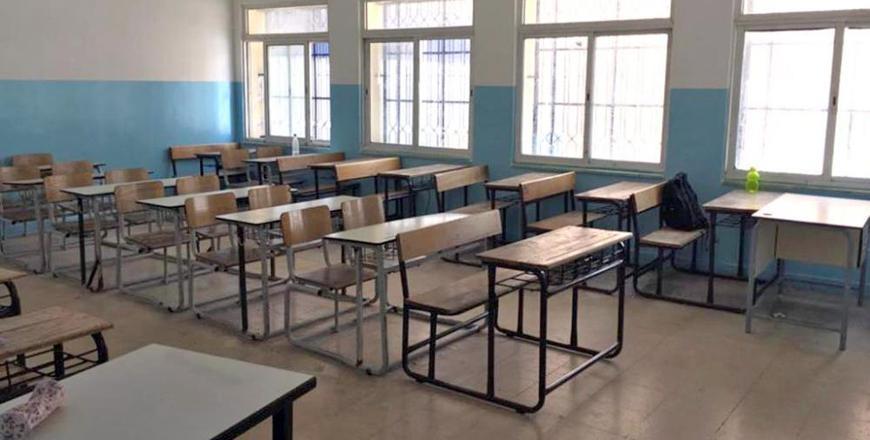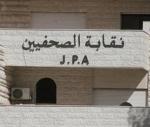You are here
Thabahtoona urges Education Ministry to reconsider recent Tawjihi decisions
By Bahaa Al Deen Al Nawas - May 09,2020 - Last updated at May 09,2020

An empty classroom is seen in this undated picture at a public school in Amman (File photo)
AMMAN – The National Campaign for Defending Students' Rights (Thabahtoona) on Saturday issued a statement addressing the Education Ministry’s decisions regarding the General Secondary Education Certificate Examination (Tawjihi) issued recently.
The ministry kept the Tawjihi exam’s date unchanged, deleting the last unit from every subject, and announcing that only 15 per cent of a subject’s overall weight is to be included in the exam, the statement said, noting that the ministry also reduced the number of examination days from 10 to five.
“In Thabahtoona, since the beginning of the crisis, we demanded the urgent formation of a specialised committee to study deleting parts of the Tawjihi curricula for all subjects, however, the ministry rejected this proposal completely,” the statement said.
“While removing part of the material is commendable, the ministry should have taken it earlier, because it seems like [it was not founded on any] academic or scientific basis and random, as the units could have been important for students’ academic achievement,” Thabahtoona said in its statement.
It added that if the units were deleted earlier, students could have focused on other lessons instead of studying them as well.
The decision caused the deletion of “main significant units” such as the organic chemistry unit, which, according to Thabahtoona, is important for the scientific stream students, who wish to major in medical, engineering and science faculties, and the deletion of the “if clause” rule from the English language, which is “one of the most important grammar rules for students to learn”.
Regarding the decision to shorten examination days, Thabahtoona said this caused students to have two exams to sit for in one day, which “received wide dissatisfaction from students and families”, according to the statement.
Holding two exams together in one day, such as the English exam and the Jordan history exam, is pressuring for students, Thabahtoona said.
It noted that a few years back, students would sit for part of the subject in the first semester and then for the rest of it in the second semester, while now as all exams are taken at the end of the academic year, students are actually sitting for the load of four exams in one single day.
The mathematics exam for the scientific stream was set out to be held in one day, but the protest of teachers and students led the ministry to let it be held on two days, the statement said, listing more subjects, that when sat for together in one day.
As for “private studying” students, who for the first time this year sit for Tawjihi exams, they have been denied the right to redistribute the subjects’ relative weights with the deletion of parts of the curricula, the statement said.
The justification was that “those who studied at home were not affected by the suspension of education since they are not committed to regular attendance at school”, the statement added.
“The ministry did not consider the psychological impact that is as important as any other factor, which regular and irregular students suffered alike,” the statement said, noting that irregular students who sit for Tawjihi for the first time used to depend on centres to follow up on their education, which closed due to the coronavirus crisis, leaving them to continue alone and remotely like regular students.
Therefore, Thabahtoona proposed reconsidering the final Tawjihi exams’ timetable, making it 10 days again but reducing the number of days between each exam and the next from five to three.
The extension would allow for better protection and disinfection of schools, and increasing the number of schools were students can sit for exams from 400 to 800 will reduce gatherings, the statement said, noting that the extension of the period is thus in accordance with health standards.
Thabahtoona also urged the ministry to reconsider the weight of the material for irregular students who sit for Tawjihi for the first time this year.
Many social media users agreed with the statement and the demands, as Raeda Salah commented: “Even younger grades do not handle two exams in the same day well, the demands are all logical.”
“The exams’ schedule did not take the humanitarian aspect into consideration under the current conditions. How can a student living under such pressure sit for two exams in the same day and for both semesters,” Mohammad Darwish commented, agreeing with the demand to extend the time and reduce the days between each exam and the next.
Mohammad Ahmad posted a picture containing the hashtag “#new”, which claims that when irregular students registered for the exam, they were told the same rules that apply to regular students apply to them, noting also that this is their first time sitting for Tawjihi the same as them and that they have been cut off from their centres and private teachers due to the crisis as well.
Related Articles
AMMAN — The National Campaign for Defending Students’ Rights (Thabahtoona) claimed in a statement issued on Sunday that the removal of
AMMAN — The General Secondary Education Certificate Examination (Tawjihi) 2017's summer session will start on Tuesday, the Education Ministr
AMMAN — A student advocate movement on Wednesday criticised the low pass rate in the General Secondary Education Certificate Examination (Ta















